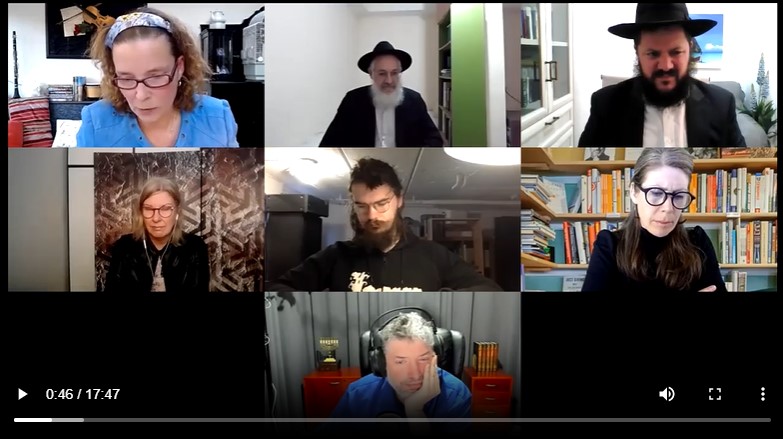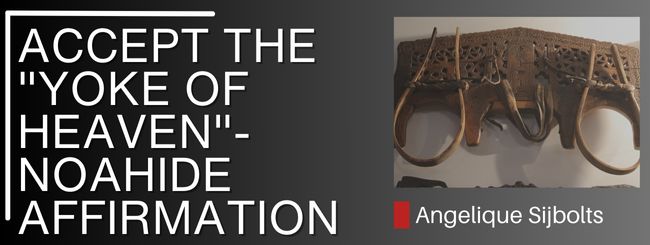2 To accept the “yoke of Heaven”, and fulfill the Seven Commandments for non-Jews, according to their details and explanantions within the Oral Torah. [1]
To accept the “yoke of Heaven”
The Hebrew word voor “accepting the yoke of Heaven” is kabalat ol Malchut Shamayim. In this, we see the word “Malchut” which means kingship. That sounds, at least to my ears, more positive. The acceptance of the Kingship of G-d. Jews accept His Kingship 3 times a day by saying the “Shema Israel“.
The word “shema” (שמע) is an acronym for שאו מרום עיניכם — “raise your eyes on high.” [To whom?] To ש-ד-י מלך עולם — A-mighty King of the world.[2]
Noahides have their variant of the Shema (Noahides may also say the Shema when one is aware that Israel is Israel. One should not start using it vicariously). There are several variants. There is for example the one composed by Rabbi J. Immanuel Schochet which is Published in The Divine Code and Prayers, Blessings, Principles of Faith, and Divine Service For Noahides.
Almighty G-d, we accept upon ourselves that which is written in Your Torah: “You shall know this day and take to your heart that G-d [alone] is G-d, in the heavens above and on the earth below – there is none other!”[1] We affirm the precepts of “You shall love G-d, your G-d, with all your heart, and all your soul, and all your might;”[2] and “Fear G-d, your G-d, and serve Him, and in His Name [alone] shall you vow;”[3] and, as it says, “Fear G-d and keep His commandments, for that is a person’s entire duty.”[4]
Source verses:
[1] Deuteronomy 4:39…….[2] Deuteronomy 6:5
[3] Deuteronomy 6:13…….[4] Ecclesiastes 12:13
Another variant for example is found in “The Order”
Almighty G-d, we accept upon ourselves You sovereign kingship and mastery:
You alone are our G-d
You alone are our King
You alone are omnipotent and
You alone are eternal.
You alone are our Creator,
You alone are our Savior.
You alone do we worship, and to
You alone do we give thanks
As it is written in You holy Torah: “You shall know this day and take unto your heart that G-d alone is G-d; in the heavens above and upon the earth below – there is none other!” [1] And, “You shall love your G-d with all your heart, all your soul, and all your means,: [2] and to “Fear G-d your G-d, and serve Him, and to vow in His Name only.”[3]Source verses:
[1] Deuteronomium 4:39, [2] Deuteronomium 6:5, [3] Deuteronomium 6:13Accepting the Kingship of G-d means being willing to carry out the divine commands He gives to the best of one’s ability, even if it contradicts one’s own emotions or feelings or thoughts.
Remember Abraham recognised that there is only One G-d Almighty and followed His commandments.
וַיֹּ֤אמֶר יְהֹוָה֙ אֶל־אַבְרָ֔ם לֶךְ־לְךָ֛ מֵאַרְצְךָ֥ וּמִמּֽוֹלַדְתְּךָ֖ וּמִבֵּ֣ית אָבִ֑יךָ אֶל־הָאָ֖רֶץ אֲשֶׁ֥ר אַרְאֶֽךָּ׃
Now the L-rd said to Abram: ‘Go out out of your country, and away from your family, and away from your father’s house, to the land that I will show you. (Genesis 12:1)
That was not easy. Leaving everything you know behind and leaving for an unknown place. But what about the commandment
וַיֹּ֡אמֶר קַח־נָ֠א אֶת־בִּנְךָ֨ אֶת־יְחִֽידְךָ֤ אֲשֶׁר־אָהַ֙בְתָּ֙ אֶת־יִצְחָ֔ק וְלֶ֨ךְ־לְךָ֔ אֶל־אֶ֖רֶץ הַמֹּרִיָּ֑ה וְהַעֲלֵ֤הוּ שָׁם֙ לְעֹלָ֔ה עַ֚ל אַחַ֣ד הֶֽהָרִ֔ים אֲשֶׁ֖ר אֹמַ֥ר אֵלֶֽיךָ׃
“Take your son, your favored one, Isaac, whom you love, and go to the land of Moriah, and offer him there as a burnt offering on one of the heights that I will point out to you.” (Genesis 22:2)
Doesn’t that go against every fatherly feeling, wouldn’t everything in you resists such a commandment? But Abraham went to do what G-d asked of him.[3] That is the sincere and right way to take upon oneself the Kingship of G-d, kabalat ol Malchut Shamayim. For Noahides that means taking upon oneself the 7 Noahide Commandments.
The acceptance of G-d’s Kingship and the 7 Noahide Laws does not require a Beth Din or witnesses but can be done individually or in person. There is no set text for this acceptance; Maimonides even says that this is a matter that depends entirely on the heart. A public declaration does have advantages, in my personal opinion. It is a rich experience for the person and it will serve him as an anchor in difficult times. Besides, it is a wonderful testimony for the people present at the testimony. Besides, especially if it does get done before a Beth Din, it feels more like an official step.
The text that can be used in the following
I hereby affirm that I accept the truth and relevance of the Noahide Code as revealed by G-d in the Torah of Moses and transmitted and explained by Moses and the succeeding Prophets of the Hebrew Bible (Tenach), and I understand to abide by this.
I accept the Torah of Moses and its traditional interpretation transmitted by the chain of authentic Torah sages through the Talmud and the Code of Torah Laws, to the recognized authorities of Halacha (i.e. Torah law and directives) of this day as the authoritative deciders of all matters on the Divine Revelation of the Noahide Code and its practical application.[5]
A personal note
I made the promise in a personal way in prayer to G-d. That was the “official” moment for me when I left Christianity for good, but did not yet know about the Noahide Code.
The second time – in the time of Corona – I was allowed to take the pledge via Zoom with 3 Rabbis. This was for me to dissolve the baptismal vow I had made at the age of 13.

The third time, I was blessed with the opportunity to take the pledge before a Beth Din in Jerusalem.
All three vows had their value. The first one because it was a starting point of something new. The second is the nullification of a previous promise. The third is a testimony to the Jewish People themselves and in the process, for myself, the reinforcement of my first promise.
The Seven Commandments for non-Jews
When G-d’s Kingship is acknowledged and accepted, the 7 Noahides commandments and their details are also observed. We find these commandments in the Tenach and the Talmud.
Rabbi Yochanan said [4], “And the L-rd G-d commanded man saying, ‘from all of the trees of the garden shall you eat’ (Genesis 2:16). “And the L-rd G-d commanded”—this refers to laws, as another verse states, ‘for I know him, and how he commands his children, etc.’ (Genesis 18:19) “The L-rd”—this refers to blasphemy, as another verse states, ‘and one who desecrates the Name of Hashem will surely die’. (Leviticus 24:16) “G-d”—this refers to idolatry, as another verse states, ‘you shall not have any other gods’ (Exodus 20:2). “Man”—this refers to murder, as another verse says, ‘one who spills the blood of man, etc.’ (Genesis 9:6)“Saying”—this refers to sexual immorality, as another verse states, ‘(saying) if a man sends his wife away, and she leaves him and marries another man…’ (Jeremiah 3:1)“From any of the trees of the garden”—and not something acquired by theft “You may surely eat”—but not the limb of a live animal
This brings us to the following 7 main categories.
- The 1st: Hadinim Leyishuvo shel olam – Commandment on justice
- The 2nd: Birkas Hashem – Prohibition of G’d blasphemy
- The 3rd: Avodah Zarah – Prohibition of idolatry
- The 4th: Damim Shefichus – Prohibition of murder
- The 5th: Giluy Arayos – Prohibition of sexual immorality
- The 6th: Gezel – Prohibition of theft
- The 7th: Eiver Min Hachay – Prohibition on eating part of a living animal
These are the 7 main categories and they include several details
The Oral Torah
The 8th principle of Torah-based Faith that was enumerated by Rambam (Maimonides) is [6]:
I fully believe that all of the Torah, as we possess it today, was given to Moses by G-d.
This means that we believe that G-d gave both the Written and Oral Torah to Moses. The Written Torah” was transcribed by Moses “from the mouth of the Almighty” and is contained within the Torah scroll. The Oral Torah was handed down by word of mouth from Moses to Joshua, then to the Elders, the Prophets, and the Great Assembly.
The men of the Great Assembly included 120 prophets and sages – such as Ezra, Nehemiah, Mordecai, Daniel, Simeon the Just, and the prophets Haggai, Zechariah, and Malachi – who formed the ultimate religious authority at the beginning of the Second Temple Era (4th century BCE). They composed the texts of the prayers and blessings that are still recited today. [7] The Great Assembly codified much of the Oral Torah in a form that could be memorized by the students. This codification was known as the Mishnah. During the generations following the Great Assembly, the Mishnah developed into a program of study for the students to memorize. Everything was passed on orally and was not yet officially recorded in writing.
This changed at the time of Roman rule and Exile. There was a fear that the Oral Torah would be forgotten and therefore lost. Temurah 14b. The Rabbi’s began to write down the Oral Torah which was eventually sealed by Yehuda the Prince in about 198 CE. Thus the final form of the Mishnah was born. The Mishnah was meant to be learned from and from. Discussions and learning points about the Misnah were initially passed on orally, and are called Gemara. The Gemara was later written down as well. This was done by Rav Ashi and his son Mar bar Rav Ashi. This is how the Babylonian Talmud came into being.
The Torah is perfect wisdom. If there were only a Written Torah, we might question the previous statement. Perfect wisdom should not raise questions, however, many things are not comprehensively or even described in the Written Torah, while G-d does expect people to observe those laws. So they must have been passed on verbally. Consider, for example, kosher slaughter. The Torah tells people to perform this correctly, but it does not tell anywhere in Scripture what this manner entails. (Deuteronomy 12:21)
The Sages over the centuries have kept the 7 Noahide Laws. It is the Rabbis of today who can pass on this knowledge to the Noahide. The knowledge on how best to observe the 7 Noahide Laws and their details.
By Angelique Sijbolts
Sources:
[1] The Divine Code p. 33
[2] Dvar Torah Questions and Answers on Va’etchanan
[3] Not Blowing the Shofar: Kabbalat Ol Malchut Shamayim?
[4] Talmud Tractate Sanhedrin 56b – see also Introduction to the Sheva Mitzvot Bnei Noach, Part One
[5] The Noahide Declaration – Affirmation for the Pious of the Nations by Ask Noah International titled “Background and Principles of an Affirmation by Chassidei Umot Ha’Olom”.
[6] Noahides and the Oral Torah
[7] Men of the Great Assembly
© Copyright, all rights reserved. If you enjoyed this article, we encourage you to distribute it further.
